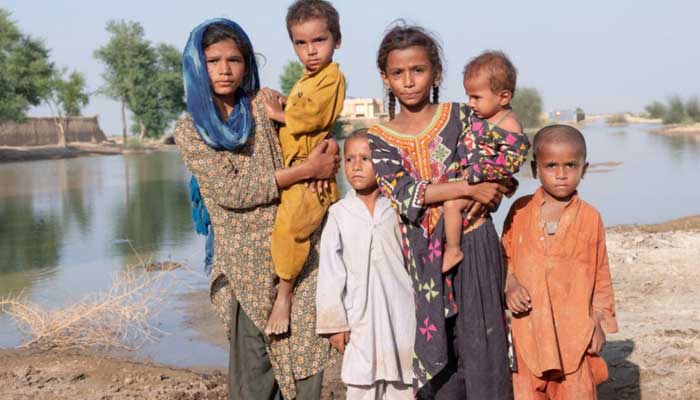Hundreds more children will die in Pakistan if int’l support does not arrive, warns UNICEF
Climate devastation in Pakistan is the ominous precursor of catastrophes to come, says George Laryea-Adjei
ISLAMABAD: United Nations International Children’s Emergency Fund (UNICEF) for South Asia Regional Chief George Laryea-Adjei warned that hundreds more children will lose their lives in the coming weeks in Pakistan if international support does not come in to scale up interventions.
The UNICEF regional chief made the remarks after visiting flood-affected areas in Pakistan on Friday. He maintained that climate devastation in Pakistan was the ominous precursor of catastrophes to come.
“As the catastrophic climate disaster continues to upend the lives of millions of children in Pakistan, it is the most vulnerable boys and girls who are paying the steepest price,” he added.
“The children I have met here have lost everything: loved ones, cherished schoolbooks, the only homes they ever knew, their schools, their sense of security,” the UNICEF Regional Director for South Asia in a news release said.
As the flood waters and the media attention recede, the crisis in Pakistan has become an acute child survival crisis. Frail, hungry children are fighting a losing battle against severe acute malnutrition, diarrhoea, malaria, dengue fever, typhoid, acute respiratory infections, and painful skin conditions. As well as physical ailments, the longer the crisis continues, the greater the risk to children’s mental health, it added.
Adjei said: “Nearly 10 million children need immediate, lifesaving support. Hundreds have already lost their lives. Over 1 in 9 children here suffer from severe acute malnutrition – a life-threatening condition. Panic-stricken parents are searching for food to bring even a simple meal home to their children.”
He maintained: “In a camp in Sohbatpur, Balochistan, I met Farida, who had fled her beloved home with her five children when the floods struck. She was worried sick about her one-year-old daughter, Rasheeda, who was visibly frail and weakened by acute malnutrition.”
Their story is one among millions, he said, adding that as winter looms, boys and girls crammed inside flimsy tents, when they are lucky enough to have one, will continue to succumb to diseases which in normal times are preventable and treatable.
“The boys and girls of Pakistan desperately need our support to survive. And yet the international appeal for Pakistan remains severely underfunded. But this story of climate devastation is not only the story of Pakistan,” Laryea-Adjei added.
Glaciers have continued to melt in Pakistan and Bhutan, while landslides in Nepal have swept away children’s homes and rising sea levels continue to threaten the very existence of Maldives.
“Children have played no part in creating the climate catastrophe in South Asia, yet they are the ones paying the biggest price. This climate catastrophe is threatening the health, wellbeing, and very survival of over 616 million boys and girls who call this region their home.
“But first and foremost, global leaders must urgently limit global heating to 1.5 degrees Celsius. This is the only way to save children’s lives. Without urgent global action, the climate devastation we have seen in Pakistan will, I fear, only be a precursor of many more child survival catastrophes to come,” he added.
-
Security forces gun down 30 terrorists in multiple IBOs in KP: ISPR
-
MQM-P calls for new province in Sindh
-
US report validates Pakistan military edge over India: PM
-
Banned TTP poses serious threat to Pakistan security: UNSC panel
-
CM Afridi clarifies remarks on by-poll after ECP requests army deployment
-
Dubai sees 3.2m Pakistani passengers in 2025 as airport sets new milestone
-
Security forces kill 23 Indian proxy terrorists in KP's Kurram
-
Pakistan to construct island to boost oil exploration: report












